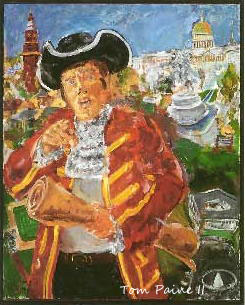Johnson Clearly Does Not Lack Standing
Lujan at 560 defines "injury in fact" as "an invasion of a legally protected interest." Herein, the First Amendment protects Johnson's invaded right to petition. This renders frivolous the district court's unargued announcement that "the fact that the Treasury website contradicts Mr. Johnson's position, and that other sources have adopted the Treasury's views, does not constitute an injury in fact." Likewise, the Treasury simply announced that having one's petitioning rendered "less plausible or effective " does not rise to the level of a violation under any law." But any such non-trivial impairment of the First Amendment right to petition is per se an injury in fact, under Lujan.
Whether that injury gives rise to an actionable violation is circumstantial. "Heightened scrutiny" is warranted if official conduct "threaten[s] to distort the market for ideas [or] raises suspicions that the objective was, in fact, the suppression of certain ideas." Turner Broadcasting System, Inc. v. FCC, 512 U.S. 622, 660 (1994). Herein, a distortion of the market for ideas intended to suppress United States notes are taken-as-true facts, but the level of scrutiny has been below due process minima owing to the turning of a blind eye to misrepresentation.[3]
"[I]t does not matter how many persons have been injured," as long as the injury is "concrete and personal." Lujan, at 581. Johnson does not sue on injuries that all share when the government lies, owing to inflated climates of distrust, unaccountability, oppression, and herein also of national debt. His viewpoint, favoring United States notes over Federal Reserve notes, is understood by few, shared by fewer, and petitioned for by fewer.[4]
Johnson's petition is inevitably impaired by the misrepresentation, because the latter forces the fundamentally contradictory belief that United States notes and Federal Reserve notes are now one and the same, for all intents and purposes.[5] Johnson cannot point to an official Treasury FAQ to win his case, as can political opposition (which incidentally raises equal protection concerns). The district court underscored causation as self-evident, by using the phrase "bully pulpit" in painting the complaint as the misdirected pique of just another loser in the jungleplace of ideas that all must share. Likewise, the Treasury conceded that its contrary statement would make Johnson's petition "less plausible or effective." Far from conjectural, causation is impossible to miss.[6]
As for remedial likelihood, a brandishable finding of misrepresentation would manifestly mitigate the cause of injury; and further findings of concomitant unconstitutionality would justifiably add further teeth to Johnson's petitions.
PART 3
The panel finally added:
We do not consider arguments and allegations raised for the first time on appeal.
This responds to a "Circumstantial Case Update" letter I filed July 1, 2013, re the Coins Act. The letter gave notice of new facts re standing to sue a director of the Government Accountability Office, and suggested that the panel "word its opinion so as to indicate whether amendments based on such facts would be fit or futile." The panel's response leaves open the door to a distinct action re the Coins Act.
FURTHER LITIGATION
New facts introduced in the update letter justify my filing a new suit against the GAO re its underreporting of the benefits that would automatically accrue to the government by a switch from Federal Reserve to United States currency, as implicit in the Coins Act. Directly suing the GAO obviously sharpens standing re these misrepresentations, plus I have a recent letter from my very own Senator (Feinstein), insisting upon the GAO estimates. Moreover, the district court's "bully pulpit" argument is invalidated by the GAO's officially objective mission. I'll post an article if and when the GAO complaint is filed, but first I shall retry to negotiate a settlement with the GAO-to get them to publish appropriate qualifying information with their benefit estimates.
The Petition for Rehearing En Banc is strictly narrowed to the Treasury's canned misrepresentation that "United States Notes serve no function that is not already adequately served by Federal Reserve notes," and to a petition that I have signed--Produce debt-free United States Notes--urging that all paper money forthwith issue as United States notes, just like Abraham Lincoln's original greenback dollars. Here are the questions formally raised in the Petition for Rehearing:
When the federal government authoritatively and persistently publishes a categorical misrepresentation so as to suppress a disfavored viewpoint (herein advocating new issues of United States notes versus Federal Reserve notes), can one whose petition is thereby impaired sue for findings of misrepresentation to mitigate this abusive impairment of the First Amendment right to petition, and, if not, does independently unconstitutional conduct make a difference?
In such a suit, is standing sufficiently alleged when the misrepresentation on its face fundamentally contradicts the plaintiff's petition?
Here is a centerpiece point:
(Note: You can view every article as one long page if you sign up as an Advocate Member, or higher).





